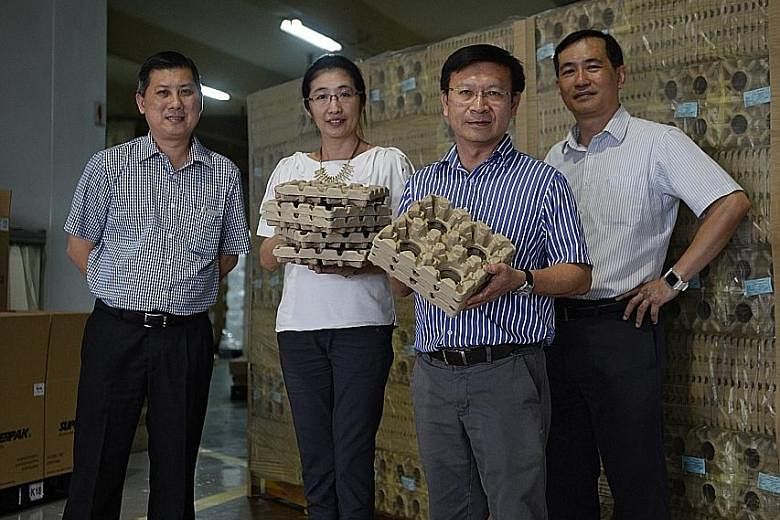Q How did the firm come to work with HP Indigo?
A Super Pak started in 1982 as a tooling house and engineering company, and was incorporated in 1985, specialising in vacuum forming - commonly used in product packaging and transportation.
We've since expanded and operate in Malaysia, Indonesia, China and South Korea, and have fewer than 200 people worldwide.
The company also serves some 700 customers.
Super Pak has supported HP's packaging needs since the early 1990s. HP Indigo wanted to work on reducing their logistics carbon footprint. They wanted to replace a packaging component that was non-biodegradable to something more environmentally friendly.
Q What was the firm's role in this partnership?
A The opportunity for partnership came about in 2012, when HP Indigo first approached us with their idea to change the material used to make the foam end caps. These caps which provide protection were made of EPS foam (expanded polystyrene). The suggestion was to change it to moulded paper pulp.
We worked with them to develop suitable paper pulp structures that could disperse the impact if ink cans fall, for example.
Ink cans are huge and heavy, and must withstand drops, and we had to think about how to create a solution that would absorb shock and keep the ink cans in good shape.
The solution we had to come up with had to be able to integrate with HP Indigo's highly automated line.
Q What areas did the firm focus on that led to new manufacturing knowledge?
A We worked so that the moulded paper pulp end caps or trays could be stacked, reducing warehousing space and transport cost. This allows HP Indigo to reduce its logistics carbon footprint.
Paper pulp is made from recycled paper that is environmentally safe and biodegradable.
EPS foam is easy to handle, but paper pulp tends to be a bit more difficult to work with.
The change is tremendous, as the effort resulted in five of the moulded paper pulp pieces being stacked in the same space that used to hold two pieces of EPS foam.
Imagine if I had to transport an equivalent quantity of moulded paper pulp, I'd have cut the transport time significantly.
Manufacturing high-quality packaging is something we've been doing all along, but in the past, we focused on functional application, which was simple.
Our new solution is different because it's high in technical requirements, and requires more engineering. And we need to know our client's product very well, which means close collaboration with our client.
It's about understanding the product requirements well.
Q What was the process like, to come up with a new solution?
A Naturally, preventing damage to the product during a fall is important. It took the teams - HP Indigo's engineering team and the Super Pak team - eight months to engineer a suitable solution.
Integrating with HP Indigo's automation line went smoothly as we had discussed the handling requirements, without sacrificing the structural integrity of the moulded pulp end cap.
We also had to work with one other SME and HP Indigo to find out how our material could fit into their production process.
This was the first time we had to create a complete solution for a customer, and like creating any product, took different iterations before we came up with the final solution.
Q What lessons did Super Pak take away from working closely with a large firm?
A We've been working with large firms, but it's the first time working so closely with one.
Most times, customers just tell us about the product they need to protect or carry, and we can easily come up with a straightforward solution. This time, we were able to tap and stretch our expertise and engineering skills.
The way HP Indigo works is structured and they are clear about their corporate objectives. With a focus, the project team had clear goals to achieve, and it made things easier for us as well, as we had a clear understanding of things. We also had support from Spring Singapore's intra-industry collaboration schemes that help SMEs grow.
Q Are there plans to expand into creating more solutions for other customers?
A We do have plans but it also depends on the customers because they will have to buy the idea at the end of the day.
It's a no-brainer for firms to be using EPS foam, as it's been used for a long time. Not many people are using moulded pulp.
We are working on it and talking to different customers about the potential of new solutions.


